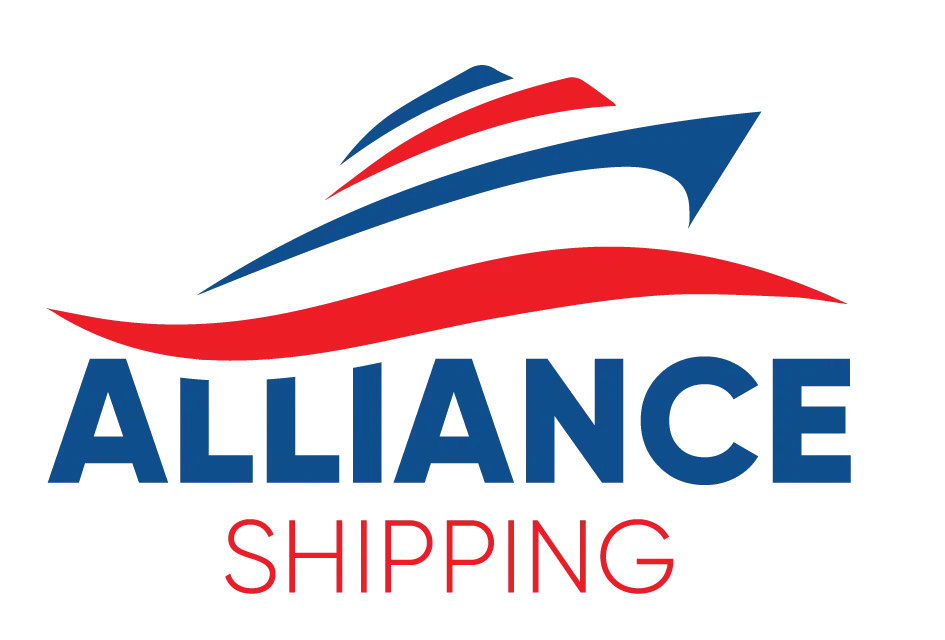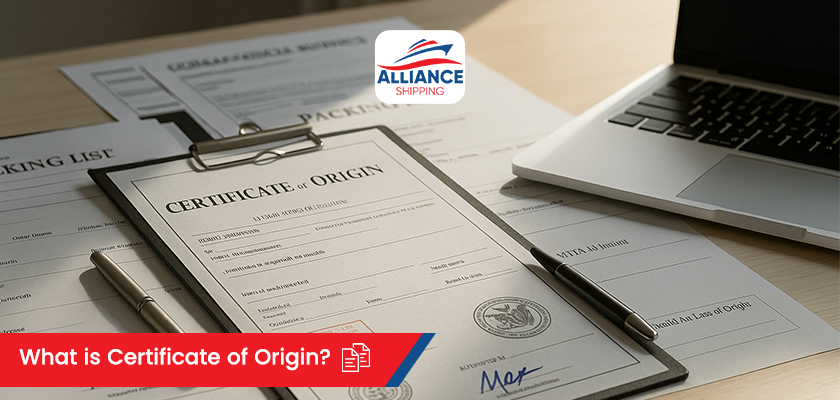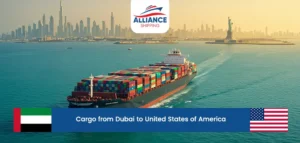Certificate of Origin (CO, C/O), also known as Declaration of Origin (DOO), is a document used in international shipping to acknowledge that a specific country manufactured a commodity or good. The exporter/manufacturer prepares this piece of paper/document, which might be subject to official attestation by an authorized third party.
A CO is submitted to the importing country’s customs department to justify the product’s eligibility for entry. The International Chamber of Commerce issues the guidelines for Certificates of Origin. Today, you will find a digital Certificate of Origin as well as a physical one. But, as time progresses, the physical ones are becoming obsolete.
To help you develop a clear concept of Certificate of Origin, Alliance Shipping has prepared an informative article so you are familiar with what a Certificate of Origin is, why it is important, and where it is used, with practical examples.
What are the Fundamentals of Certificate of Origin?
Certificate of Origin (CO) plays a key role in international shipping. It shows where a product was made and helps customs officials determine if the product is allowed to enter the country, and if any trade agreements or duties apply.
Here are the fundamental elements that make a CO important:
- Country of Origin: Clearly states where the product was manufactured.
- Exporter’s Details: Information about the company or person sending the goods.
- Consignee’s Details: Information about the person or company receiving the goods.
- Product Description: What the goods are, including quantity and weight.
- Certification: May be signed and stamped by a chamber of commerce or authorized body.
These fundamentals make it easier for customs to check and process shipments smoothly and fairly.
Types of Certificates of Origin
There are mainly two types of Certificates of Origin used in international trade:
- Non-Preferential Certificate of Origin
This type confirms the origin of goods but does not provide any special trade benefits. It’s used when no free trade agreement is involved. Most countries require this to track trade and apply standard customs duties.
- Preferential Certificate of Origin
This is used when countries have a trade agreement that allows goods to enter at reduced or zero tariffs. It gives the importer a financial benefit and encourages more trade between the countries.
Both types of Certificate of Origin are important, and the shipper must choose the correct one based on the trade route and agreement.
The Importance of Certificate of Origin
In summary, a Certificate of Origin supports honest trade, protects both buyers and sellers, and helps ensure that your cargo moves across international borders without problems. It helps make the entire shipping and customs process smoother and more transparent. Here’s why it matters:
- Customs Clearance: A CO is often required by the importing country’s customs department to allow goods to enter. Without it, your shipment might get delayed or even rejected.
- Trade Agreements & Tariffs: Many countries have trade deals that reduce or remove taxes on certain goods. A CO proves your goods qualify for these benefits, helping importers save money.
- Legal Requirement: Some countries make it a legal rule to submit a CO for specific products. Not having it can lead to penalties or issues with authorities.
- Proof of Authenticity: It shows that the goods are genuinely produced in the country claimed. This is important for quality control, fair trade, and brand trust.
- Smooth Business Operations: With a proper CO, businesses can avoid misunderstandings, delays, and extra costs.
Where is Certificate of Origin Used?
A Certificate of Origin (CO) is used in the following main places:
- Customs Departments: Customs officers in the importing country use the CO to check the origin of goods and decide what taxes or duties apply.
- Banks: When trade is done under a letter of credit, banks may require a CO as part of the documents needed to release payment.
- Importers & Exporters: Businesses use the CO to prove where the goods come from, especially if they want to benefit from trade agreements.
- Logistics Companies: Freight forwarders and shipping agents may need the CO to complete documentation and avoid delays.
How You Can Get a Certificate of Origin?
You should follow these steps to get your certificate of origin:
Step 1: Prepare Your Documents. Gather all shipping documents like the commercial invoice, packing list, and details of the goods.
Step 2: Choose the Right CO Type. Decide if you need a preferential or non-preferential Certificate of Origin, based on your trade agreement.
Step 3: Apply Through an Authorized Body. Most countries have Chambers of Commerce or trade authorities that issue COs. You can apply through them either in person or online.
Step 4: Submit Your Application. Provide the required documents and details. Some platforms allow you to upload everything digitally.
Step 5: Get Your CO Certified. The authority will check your application and, if everything is correct, they will issue and stamp the Certificate of Origin.
Step 6: Receive the CO. You’ll get a physical or digital copy that you can use for shipping and customs.
Many exporters now prefer digital COs for faster processing and easier tracking.
Learn Logistics with Alliance Shipping
So, that was all about the Bill of Lading. We hope this blog helped you gain a better understanding of the BOL document and its importance. Alliance Shipping regularly covers various shipping topics to help you build a basic knowledge of key shipping terms.
If you’re interested in using our cargo shipping services from Dubai, UAE, feel free to contact us at +971 56 649 5103 or email us at manager.dxb@theallianceshipping.com.























